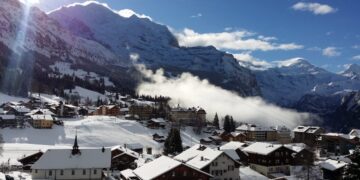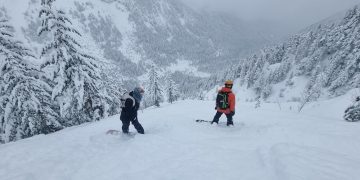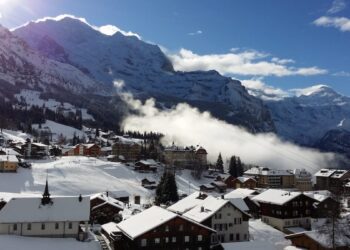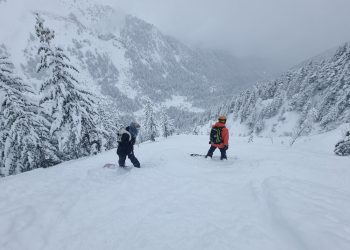Spending a ski season in the mountains, riding on your days off, and immersing yourself in the unique ski resort lifestyle is a dream for many. But making it happen does require a bit of prep. And this goes double for for British workers navigating post-Brexit employment rules, or non-European passport holders hoping to head to the Alps or Pyrenees for a season (or two).
Fortunately, there are still plenty of ways to secure a seasonal job in the Alps and beyond. Whether you’re looking to work as a chalet host, ski instructor, or even working remotely while living in a ski town, this guide will walk you through the best roles, where to find them, and how to get hired.
Before you go
Planning your ski season
Planning your ski season can be an exciting yet challenging task. First of all you’ll need to choose your ideal location, or a shortlist. Working a ski season means you’ll be getting to know a town and an area intimately – which might mean you need to consider your choice of ski resort.
Bigger resort towns such as Chamonix, Morzine, St Anton or Zermatt are not just winter sports hubs but also year round towns. This can mean more things to do than just snow sports. But if you’re looking for maximum snow time, you might also want to choose somewhere higher up or more snowsure.
Generally speaking, you’ll need to consider what each location offers in terms of job opportunities, cost of living, and the length of the ski season. Popular resorts like Val d’Isère, St Anton, and Verbier are known for their vibrant ski season life and abundant job openings – but they’re expensive places to live. Which can be a factor when you’re on a low wage (which, lets be honest, many ski jobs are).
Creating a budget is also a very good idea. You’ll need to factor in accommodation, food, ski hire, and other living expenses (yes, including your party habits). An itinerary can help you stay organized and ensure you don’t miss any important deadlines in the run up to your ski season, such as job application dates.
Speaking of which, applying early is key. Many ski season jobs are filled by late summer, so start your search and send out applications as soon as possible.
Lastly, plan your accommodation and transportation in advance. Whether you’re staying in staff housing or renting a private apartment, securing a place to live will make your transition to ski season life much smoother.
Preparing for your ski season
Once you’ve secured a place for your upcoming ski season there are a few extra steps before you’re ready to go.
Firstly, make sure to get yourself some high-quality ski gear. While you might be used to packing for ski holidays, you might need more and better gear. A good helmet, goggles, and warm clothing will all make a significant difference.
Be prepared for all weathers too. Yes, it gets cold and snowy – but late season mountain conditions can be relatively warm – even hot and sunny. So don’t forget suncream and a few lighter clothing items.
If you’re new to skiing or snowboarding, don’t just assume you’ll pick it up during your seasonnaire experience. Consider taking lessons at a ski school to build your skills and confidence – especially as an injury could really ruin all your plans.
Financial preparation is equally important. Ensure you have enough savings to cover your expenses throughout the season. It’s also wise to take a first aid course, as knowing how to respond to emergencies on the mountain can be invaluable.
The impact of Brexit on ski season jobs
Before Brexit, British workers could easily take on seasonal jobs across the EU. Now, restrictions have tightened, and most roles require a work visa. This can be a barrier to some typical jobs such as chalet work or drivers.
But… Plenty of opportunities remain accessible. Some British tour operators still sponsor visas for specific positions, while others have shifted their recruitment to EU passport holders. Despite these hurdles, options do exist for those willing to put in the effort.
A simple way around this is usually to pay for a course to become a ski instructor. If this isn’t your goal then you could still find work in some of the roles below…
Best jobs for a ski season
There are a variety of roles available in ski resorts, catering to different skills and experience levels. Below are some of the most common positions:
1. Chalet host
A chalet host is one of the most popular ski season jobs. Responsibilities typically include:
- Cooking breakfast, afternoon tea, and dinner for guests
- Cleaning and maintaining the chalet
- Providing a friendly and welcoming environment
Pros: There is normally time in the day and the week to enjoy a spot of slopeside activity. You do also sometimes get accommodation and some food provided.
Cons: It can be a lot of work for not much pay.
How to get hired: Experience in hospitality or cooking is a plus, but enthusiasm and a strong work ethic matter most. Many tour operators offer training before the season starts.
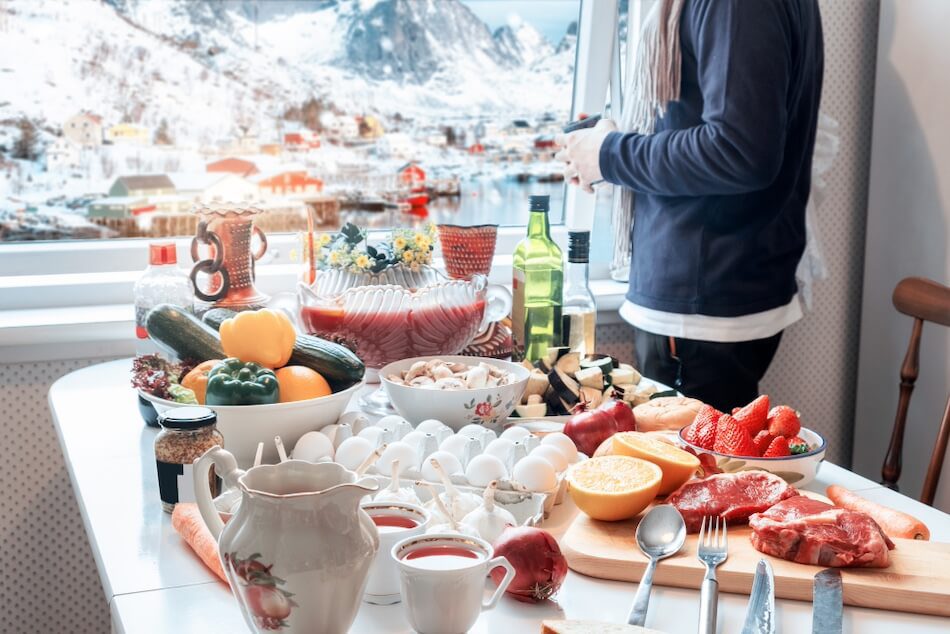
2. Transfer driver
Driving guests between airports and resorts is a great role for those who enjoy being behind the wheel. You will usually be required to drive in all weathers, so confidence on the road will be a plus. Requirements include:
- A clean driving licence (often held for at least two years)
- A professional driving qualification (such as a Passenger Carrying Vehicle – PCV – licence for larger vehicles)
- Good customer service skills
Pros: One of the easier jobs in resort towns. You also often get a decent amount of time to spend on the mountain, with regular days off, often during the week. Changeover days will be the busiest, sometimes with multiple runs.
Cons: Driving conditions can be hairy at times. You may also end up working late nights or early mornings, picking and dropping off clients for those early flights. Pay can also be quite low.
How to get hired: Some transfer companies provide training, but securing a job may be easier if you have a commercial driving qualification in advance.
3. Ski instructor
For those with a passion for skiing and teaching, instructing can be the ideal role. After all, you get to share your passion with plenty of other people. However, it requires qualifications, such as:
- BASI (British Association of Snowsport Instructors) Level 2 or higher
- Other recognised certifications (e.g., ESF qualifications in France)
Pros: Lots of time on the mountain! And you’ll get to meet lots of different people from all walks of life… You also get preferential access to the lifts and will likely make good connections in the resort. Also, you’re getting paid to ski – what could be better?
Cons: While you spend a lot of time on the mountain, your speed and experience mostly be dictated by your clients. But thats a pro too, right?
How to get hired: Many instructors start by working as trainees and gaining experience on the job. Some companies offer internships that lead to paid roles.
4. Childcare roles (Nannying and kids’ clubs)
Ski resorts always need childcare staff to look after young guests while their parents are on the slopes. Or, sometimes to take the kids up to the slopes to have fun in the snow – which might not always involve skiing. Typical roles for ski resort childcare include:
- Private nannying
- Working in hotel kids’ clubs
- Teaching beginner ski lessons
- Private creche and nursery
Pros: A great role for those who love working with kids – with lots of opportunity for fun.
Cons: You might not have the most time free to enjoy skiing as you’ll usually be working during lift hours.
How to get hired: Having childcare experience and relevant qualifications (such as a Level 3 childcare certificate) can be beneficial.
5. Chefs and catering staff
Restaurants, hotels, and chalets all need chefs, kitchen assistants, and waiting staff. Skilled chefs are particularly in demand and this is one of those roles where you might get visa sponsorship – for the right role.
The right restaurant might also keep you on throughtout the year, not just the ski season. Which can be a great way to build a life in your ski resort of choice.
Pros: Good chefs are always in high demand. If you can get up early then you might just get time on the mountain too.
Cons: Unsociable hours – but then you knew that already.
How to get hired: A professional culinary qualification helps, but some roles accept applicants with basic cooking experience. Waiting staff are usually hired locally, but you can always try and apply for waiting or front of house roles if you have experience.
6. Bar and restaurant staff
Working in a resort bar, pub or restaurant is a social and lively option for a ski season job. While experience is often preferred, a good attitude and ability to work in a fast-paced environment are key. It will help if you have experience too.
Pros: There is always demand for bar or fast food staff. Hours can be good for those who want to get in plenty of ski time.
Cons: Pay might be low and they’re unlikely to sponsor your visa. However there is usually some ‘casual’ work available meaning you might be able to work off the books. While this might sound tempting, it does mean you’re breaking the law and could get in trouble… Do your own research.
How to get hired: Keep an eye on local job sites, check Facebook groups and ask friends who might already work in the industry.
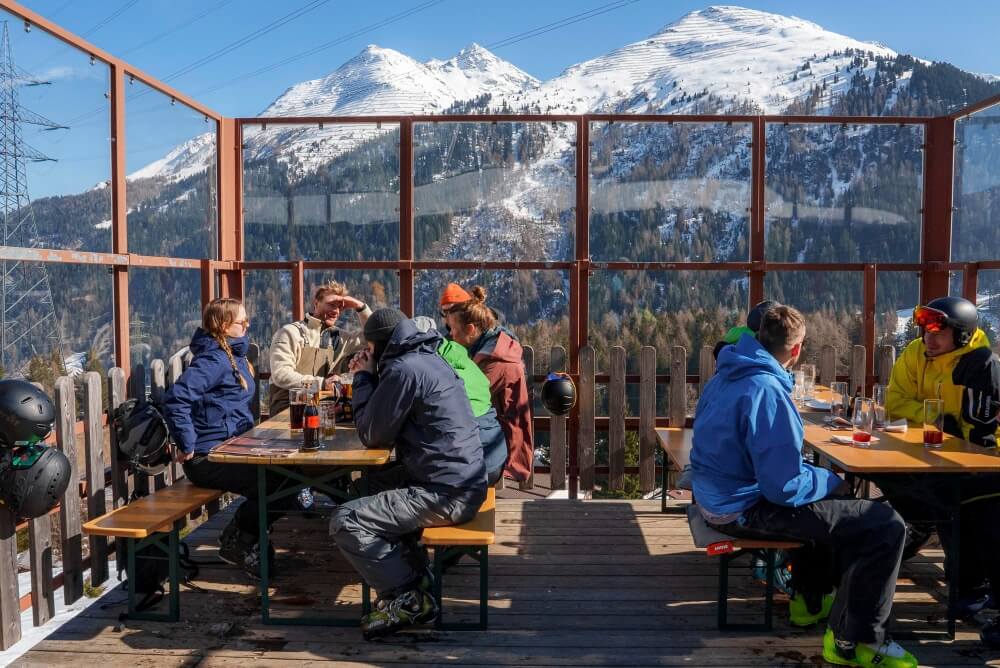
7. Musicians and entertainers
Live music and entertainment are integral to the apres ski culture, making it a lively option for musicians and entertainers during the ski season. If you’re a musician, DJ, or performer, some resorts hire acts for the season.
Pros: Lots of time to ski. Decent pay and hours – relatively speaking.
Cons: Might be ad-hoc work. Might not be your perfect audience – but should still be good fun.
How to get hired: Contact bars and venues directly, or look for agencies that book seasonal performers.
8. Professional roles in hospitality
While seasonal jobs might be the most obvious ways to work a ski season, there are plenty of higher end professional roles. Some examples might include:
- Hotel manager
- Marketing or tech support
- Event management
- Reception or concierge
These roles will tend to require better qualifications and experience, but will also pay better. They’re also more likely to be a longer term role allowing you to build your professional experience and max your time on the mountains too.
Pros: Often lots of demand at hotels, spas, resorts etc. Full time jobs usually means better pay and days off to enjoy the mountain.
Cons: Harder to secure the right role. Might require visa sponsorship.
9. Working remotely in a ski resort
For digital nomads (digital snowmads), working remotely while living in a ski resort is an increasingly popular option. In fact some places such as Bansko in Bulgaria have become popular with the digital nomad set as they offer a low cost of living and access to the slopes.
Working remotely is obviously ideal for those with jobs in:
- Tech and programming
- Writing and content creation
- Digital marketing
- Remote customer support
Pros: If your job allows it, this can be great option. Work your hours and find the time in your day to ride.
Cons: Most ski resorts are expensive places to live.
How to get hired: Secure a remote job before moving. Many resorts now offer co-working spaces for digital workers.
When and where to look for ski season jobs
The ski season refers to the months when ski resorts are open for winter sports activities, typically from late November to early April. The best time to apply for ski jobs varies by role and country. However, most employers start recruiting between June and September for the winter season, which typically begins in December.
Best locations for work
- France – Popular resorts like Val d’Isère, Méribel, and Morzine have a high demand for seasonal workers. These locations are not only great for work but also offer memorable ski holidays with a blend of excitement and social opportunities.
- Austria – St Anton, Mayrhofen, and Kitzbühel offer many roles, especially in hospitality.
- Switzerland – Resorts like Verbier and Zermatt might pay well but often require work permits.
- Italy – Courmayeur and the Dolomites have ample opportunities, particularly in childcare and hospitality.
- Andorra – Offers seasonal work with fewer visa restrictions than the EU. This can make it competitive though.
- Bulgaria – Increasingly popular with the digital nomad set. While there might be seasonal work it might not pay that well compared to other locations.
- Scandinavia –
Where to Find Jobs
- Specialist ski job websites:
- Ski Jobs
- Season Workers
- Natives
- Direct employer websites – Many ski tour operators, hotels, transfer companies and restaurants recruit through their own websites.
- Social media and expat forums – Facebook groups like ‘Ski Season Workers’ are useful for networking.
Working a ski season involves navigating various logistical challenges, such as paperwork and obtaining necessary certifications, but the benefits and perks definitely make it worthwhile.
Tips for securing a job
- Apply early – Some of the best roles get filled by mid-summer.
- Be flexible – Being open to different locations or roles increases your chances.
- Highlight relevant skills – Even non-hospitality experience can be valuable.
- Follow up on applications – A quick email or call can make a difference.
- Get your paperwork in order – Ensure your passport, visa, and any required qualifications are ready.
- Different ski seasons offer varying experiences and opportunities, so being flexible and prepared can increase your chances of securing a job.
Living in a ski resort
Finding accommodation
Finding accommodation in a ski resort can be one of the trickiest parts of planning your ski season, but there are several options to consider. Many ski businesses such as chalets offer staff accommodation, which is often the most budget-friendly option. Living with fellow workers can also be a great way to make friends and immerse yourself in the ski bum lifestyle.
If staff accommodation isn’t available, shared housing is another cost-effective choice. Sharing an apartment or house with friends or colleagues can reduce living expenses and create a social living environment. For those seeking more independence, renting a private apartment or house offers flexibility, though it can be more expensive.
Online resources like Le Bon Coin (in France), Facebook groups, and local classifieds are excellent for finding available rentals. Additionally, local real estate agents can provide valuable assistance in securing accommodation. Remember to start your search early, as housing in ski towns can fill up quickly.
In summary
Doing a ski season is a fantastic way to spend the winter. Offering not just an adventure, but a different way to experience the life in the mountains. You will most likely make tons of friends, enjoy great snow conditions and make memories that will last a lifetime.
Yes, it might take some savvy and persistence to land your perfect role – but get the ball rolling and who knows where you might end up.
Maybe see you out on the slopes?


